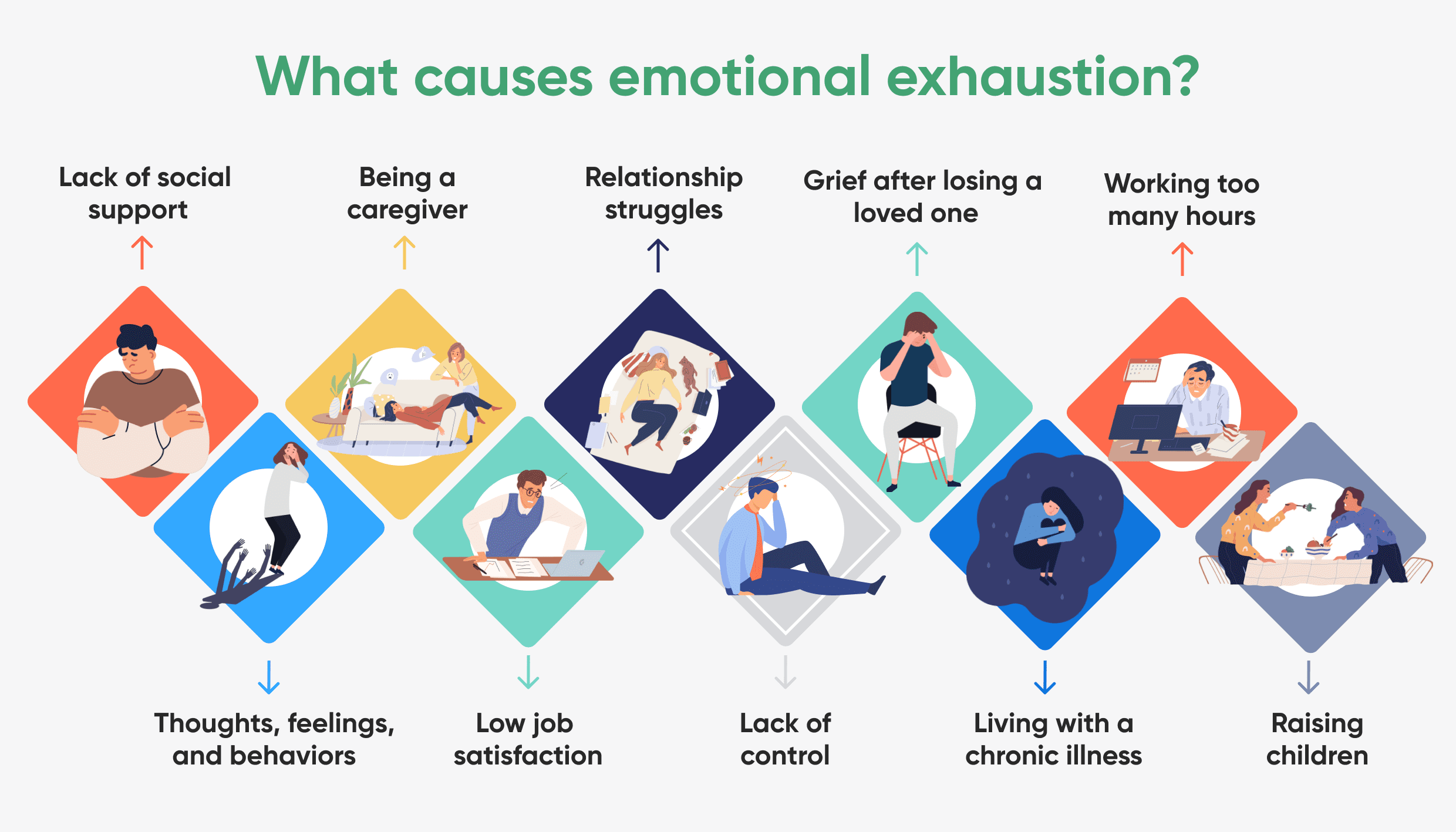MENTAL EXHAUSTION
Most of us are feeling tired. Whether it’s from work, family, running after kids, or simply insomnia, we all deal with feeling tired in one way or another. For some, this sense of feeling tired can be short-lived and overcome by making simple changes; for others, it can turn into long-term exhaustion and mental exhaustion. Overcommitting to things, whether it’s social events or projects at work, is bad for your brain. When you have too many tasks at any one given time, you end up being pulled in different directions, which can impact productivity and cause cognitive overload.
Mental exhaustion is usually the result of long-term stress. When you’re continually dealing with things that activate your body’s stress response, your cortisol levels remain high. Eventually, this begins to interfere with normal body functions, such as digestion, sleep, and your immune system.
Professionally speaking, working more than you should can lead to burnout—a psychological response to chronic stress. Staying late at the office once in a while is OK, but it shouldn’t be a daily habit. Perfectionism and having unrealistically high standards for yourself also contribute to mental exhaustion. It puts unnecessary stress on yourself and can cause you to exert more energy than needed when carrying out tasks.

Medical causes
Medical causes of fatigue may cause unrelenting exhaustion with additional symptoms. There are a number of diseases that trigger fatigue. If you find yourself experiencing long periods of fatigue, talk to the specialist to determine the root cause. Broad disease categories can classify the medical causes of fatigue. Some of these disease categories are:
- Metabolic/endocrine: Conditions such as anemia, diabetes, hormonal imbalances, or liver or kidney disease
- Infections: Influenza, tuberculosis, or malaria
- Cardiac (heart) and pulmonary (lungs): Congestive heart failure, chronic obstructive pulmonary disease (COPD), arrhythmias, and asthma
- Mental health: Depression and anxiety
- Sleep problems: Sleep apnea, insomnia, and restless leg syndrome
- Vitamin deficiencies: Vitamin D deficiency, vitamin B12 deficiency, or iron deficiency
- Other conditions: Cancers and rheumatic/autoimmune diseases
- Medications you are taking to treat other health conditions may also cause fatigue. This can include anti-depressants and anti-anxiety medications, sedative medication, some blood pressure medications, chemotherapy, radiation therapy, and steroids.
WHAT ARE THE SYMPTOMS OF MENTAL EXHAUSTION?
Difficulty concentrating, irritability, mental block, loss of interest in certain activities, and change in appetite are all symptoms of mental exhaustion. Sleep problems also indicate brain fatigue. Quality sleep is a bit of a chicken-and-egg situation: if you don’t get enough sleep, you’re more likely to suffer from exhaustion, but when you’re stressed or mentally wiped, your sleep patterns tend to suffer. Your mental health can also be affected. Even though fatigue is a symptom of some underlying condition, it can still cause a combination of mental and physical symptoms, including:
- Weakness
- Lack of energy
- Constant tiredness or exhaustion
- Lack of motivation
- Difficulty with concentration
- Difficulty starting and completing tasks
You Feel Detached
A feeling of detachment, apathy, and indifference is a common indication that you may be mentally fatigued. Mental exhaustion, or as some people like to call it, ‘burnout’, usually causes people to lose interest in things they normally enjoy doing. It may begin gradually as you begin losing interest in work, slowly progressing until nothing excites you anymore. As a result, you may begin feeling detached from reality leading to frustration and helplessness.
You Feel a Headache Coming
It is commonly believed that mental exhaustion is something that only affects the mind. However, that is not entirely correct. Signs of mental exhaustion are not just limited to emotional and mental changes and disturbances. Physical and behavioral symptoms usually accompany emotional changes as well, hence, random body and muscle aches are the most common indication of mental fatigue. If you feel an onset of a headache coming, in addition to other signs of burnout, there is a good chance you may be suffering from mental exhaustion.
You Feel Unmotivated
Mental exhaustion is notorious for sucking the motivation out of you, leaving you tired and dispassionate, unable to work, study, or do things that you normally do. For instance, someone who loves to paint may not feel motivated to paint anymore. And, even if they do force themselves to do so, they may find that they’re having a hard time concentrating. Lack of motivation isn’t just feeling detached and unconcerned. It goes beyond feelings of disinterest as your motivation takes a nosedive, leaving you unproductive and hopeless.
You Have Trouble Sleeping
Insomnia is among the major signs of mental exhaustion. It is a common sleep disorder that affects your ability to go to sleep, stay asleep, or affects the quality of sleep you get each night. Such changes in sleep patterns can result in restlessness throughout the day which can greatly affect productivity and efficiency. Luckily, there are numerous self-care tips and remedies that can help you improve the quality of your sleep.
You Feel Overwhelmed
When you’re tired and aren’t feeling your hundred percent mentally, the littlest of things tend to overwhelm you. When insomnia doesn’t allow you to rest, your body aches and your interest is lost, it becomes difficult to focus. As a result, you find yourself mentally drained and overcome with exhaustion, as everything seems like an overwhelmingly massive task.
You Are Irritable
As you feel unproductive and lethargic along with body aches and sleepless nights, you’ll want to stay away from people. You might notice that you’re pushing your social life away and you’re turning into an isolated person who doesn’t seem to want to talk to anyone. No matter if you’re at work or in a social setting with family or friends, it’s as if everything and everyone exists solely to irritate you.
You Feel Stressed and Anxious
Although mental exhaustion is not the same thing as stress, chronic exposure to stress can exhaust the body. Increased stress and anxiety is one of the most common signs of mental exhaustion. High levels of anxiety over a long period of time can cause serious issues as well, for example, you’ll be more likely to experience panic attacks and suffer from diarrhea, nausea, jitters, and nervousness.

HOW CAN YOU DEAL WITH MENTAL EXHAUSTION?
If you’re experiencing symptoms of mental exhaustion, it is important to get back to basics and check in with yourself to see if you’re getting enough sleep and eating properly. Quality sleep and a balanced diet may sound obvious, but they’re super important to mental health.
Regular exercise also helps manage stress and reduce anxiety.
Plus, it’s important to understand what drains you and what doesn’t and be aware of how certain things will affect your functioning. Knowing what mentally depletes you will help you prepare coping strategies.
MENTAL EXHAUSTION TREATMENT
Fatigue is a common complaint related to health issues. Notably, it is a symptom and not a specific disease or health condition. Many illnesses cause fatigue, and the symptoms can be physical, psychological, or a combination of both. According to the National Security Council (NSC), fatigue impacts most Americans and can lead to disaster all too often. Fatigue presents with a range of symptoms and is often caused by several different factors working in combination. That makes finding a diagnosis more difficult. Therefore, treatment centers, like Lifescape Recovery, will try to determine what is causing fatigue using a number of tests, including the following.
Treating and coping with mental exhaustion
Remove the stressor
If you’re overwhelmed by your responsibilities at home or work, consider asking for help with tasks or delegating some of your responsibilities to others.
Enlisting the help of professional services is another way to help lighten your load, such as respite care or a personal support worker if you’re a caregiver for a loved one. Babysitting, cleaning, and running errands are other responsibilities you can outsource.
Take a break
Taking a walk on your lunch break or taking in a movie with a friend once a week can do wonders for your stress levels.
Exercise
It’s not easy to find the motivation to exercise even on a good day, but exercise has many proven benefits for your physical and mental health. You don’t need to engage in a complex or high-intensity activity to reap the benefits. Moderate exercise, such as a brisk walk, is enough.
A 2010 cross-sectional study of 533 Swiss police and emergency response service corps found that exercise was associated with enhanced health and protected against stress-related health problems.
The participants of the study also felt better prepared to cope with chronic stress. Based on the results, moderate exercise was better suited to reduce stress than vigorous exercise.
Other proven benefits of exercise include:
- lowered stress levels
- reduced anxiety
- improved mood
- a stronger immune system
- Relaxation techniques
Examples of other relaxation techniques include:
- yoga
- tai chi
- deep breathing
- biofeedback
- massage
- aromatherapy
- progressive relaxation therapy
- Get more sleep
- Sleep is necessary for your emotional well-being. Aim to get the recommended eight hours of sleep each night.
One of the best ways to ensure a good night’s sleep is to avoid spending too much time in bed throughout the day—something to which mental exhaustion may contribute.
Develop a bedtime routine and stick to it, such as doing some light reading for a few minutes before turning in at the same time every night.
Keep a gratitude journal
A set of three studies published showed that people who practice gratitude and gratitude exercises enjoy:
- higher well-being
- fewer symptoms of physical illness
- reduced stress
- happiness
- higher relationship satisfaction
- improved sleep Trusted Source
- better physical health
- Medical treatment
Speak to a doctor about your symptoms. Your doctor may suggest medications to help manage your symptoms as you work through your mental exhaustion with other techniques and therapy. Medications that may be used to treat mental exhaustion include antidepressants, anti-anxiety medications, and sleep aids.


Lifescape Recovery Mental Health is a top-rated mental health and addiction treatment facility in Los Angeles, California. We create a safe space for patients to explore their mental health goals and needs. We offer a free, confidential consultation to any new clients and provide a number of different therapies to treat a wide spectrum of mental health struggles, such as depression, anxiety, eating disorders, and substance use disorders. Our IOP and PHP facility is fully accredited. We are one of the highest-rated centers for mental health treatment in Los Angeles, California, which provides both in-person and online therapy. Our patients express endless gratitude and appreciation for the staff and the services and recommend Lifescape Recovery to their friends, colleagues, and community. There has never been a more important time to address mental health needs! Contact us today!
Published: January 05, 2022
Last Updated: June 23, 2025

Published: June 30, 2025
Do Semaglutide (Ozempic®/Wegovy®) or Tirzepatide (Mounjaro®/Zepbound®) Reduce Alcohol Cravings?
GLP-1–based injectables like Semaglutide (Ozempic®/ Wegovy®) or Tirzepatide (Mounjaro®/ Zepbound®) changed obesity and diabetes care almost overnight. Alongside weight loss, thousands of patients began reporting a subtler effect: “I just don’t want that nightly glass of wine anymore.” Such feedback—spread across Reddit, TikTok, and clinic waiting rooms—now drive genuine scientific inquiry. If GLP-1 agonists like […]
Read more
Published: June 01, 2025
Honoring Men’s Mental Health: A June Reflection and Path to Wellness
Each June, we shine a spotlight on Men’s Mental Health Month—a dedicated time to recognize the unique challenges men face, break down stigmas, and foster open conversations. At Lifescape Recovery, we believe that mental health is just as critical for men as it is for anyone else. Yet societal expectations around “toughness” and self-reliance often […]
Read more
Published: May 23, 2025
Intensive Outpatient Program (IOP):15 FAQs
Navigating the world of mental health and addiction treatment can feel overwhelming. If you’re considering an Intensive Outpatient Program (IOP), you likely have questions about what it entails, who it’s for, and how it works. Below, we’ve compiled the most frequently asked questions—along with clear, concise answers—to help you understand IOP and determine if it’s […]
Read more
